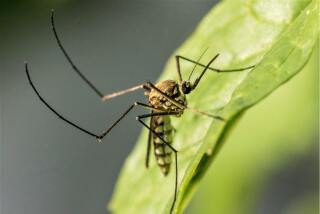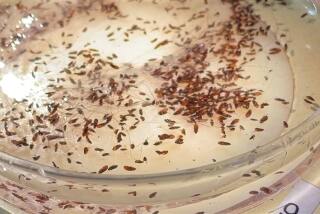O.C. Admits ‘Glitches’ in W. Nile Case
- Share via
Orange County Health Care Agency officials acknowledged Monday that they erred in not notifying the family of the state’s first West Nile virus fatality before holding a news conference last week.
Relatives of Fullerton resident James Damiano, 57, learned the cause of his death when contacted by a Los Angeles Times reporter.
Assemblyman Todd Spitzer (R-Orange), who said the announcement was poorly handled, met with health officials Monday to improve the flow of information. “There was a breakdown in communication between the Health Care Agency and the treating physician, and that’s unacceptable,” he said.
Members of the Health Care Agency blamed “a couple of glitches.” The county agency’s medical director did not receive the results of a private lab test from a member of the staff. In addition, the private lab did not forward Damiano’s blood sample to the state laboratory.
Dr. Mark Horton, Orange County health officer, said the agency is taking steps to ensure that families of those who die of West Nile virus are notified before the agency issues a public statement.
Supervisor Chris Norby said he spoke to James Damiano’s brother Joseph by telephone over the weekend: “[I told him] we wanted to handle it better in the future. I expressed our condolences and regret on behalf of the county.”
But after viewing a videotape of the briefing, Joseph Damiano said he felt Monday’s news conference was history repeating itself. He said the health agency should have contacted his family about why it had erred before speaking to the media.
“It sounded like the same thing that happened before,” he said. “They should have let me know what happened in advance. I learned it on TV with everyone else again.
“I haven’t even heard from the health department. They’re not admitting they did anything wrong. They said there’s a few problems and they’re going to correct it.”
Meanwhile, Southern California residents are nervously reporting dead birds to county and state officials for West Nile virus testing, but more often than not are being turned away with a “Thanks, but no thanks.”
State officials said that in many ZIP Codes throughout Southern California, they have suspended testing dead birds.
“After a while, it’s information we don’t need anymore,” said Michael Hearst, spokesman for the Orange County Vector Control District. “It would keep telling us the same thing over and over again -- the virus is here, the virus is here, the virus is here.”
Calls to the state’s dead-bird hotline and to local agencies have increased in the last two weeks. Orange County Animal Control receives 40 to 60 reports a day, compared with 15 to 20 during the same period last year.
Anaheim resident Linda Rhodus said she spent two hours on the phone Friday with the health department, vector control and animal control trying to get a dead crow picked up. Officials told her to discard it on her own.
“This is the second bird in three weeks,” Rhodus said. “They did not take it for testing, so how do they know if it died of West Nile? How would they know whether to spray or not?”
Of the surveillance methods used to track West Nile virus, officials say dead birds are the least effective and informative.
If a bird tests positive, it indicates only that the virus is present -- something that is already known -- not where the disease was contracted or how prevalent the disease may be in a certain location.
Joan Mulcare, program manger for the San Bernardino County Vector Control program, which was hit first with West Nile cases, said that in Fontana, for instance, testing was stopped once several human cases had been reported and many dead birds had tested positive.
The disease is transmitted by mosquitoes from infected birds to humans and horses. Damiano, who died June 24, was the state’s first fatality. The virus has been detected in 18 California counties.
Residents are encouraged to wear long-sleeved shirts and pants, apply insect repellent containing DEET, and eliminate standing water where mosquitoes can breed.
Times staff writers Janet Wilson and Kimi Yoshino contributed to this report.
More to Read
Sign up for Essential California
The most important California stories and recommendations in your inbox every morning.
You may occasionally receive promotional content from the Los Angeles Times.










